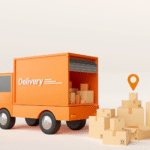When launching or developing an e-commerce site, the question of the logistics budget is unavoidable. However, estimating ecommerce logistics costs often remains unclear for e-tailers. How can you anticipate the costs of preparation, storage and shipping? What factors really influence your logistics bill? And how can you avoid unpleasant surprises?
This article offers you a clear method for evaluating the logistics costs of your online store, while highlighting best practices inecommerce logistics outsourcing. Iziship, an experienced ecommerce logistician, helps you to see things more clearly.
Why anticipate logistics costs in ecommerce?
Ecommerce logistics is one of the most strategic and variable areas of an online business. The wrong estimate can have an impact on :
- Your sales margins
- Your cash flow (advance payments, carrier penalties, etc.)
- Customer experience (delays, errors, return costs)
Anticipating yourecommerce logistics cost estimate means laying the foundations for a profitable, scalable model. It also means knowing whether it’s in your interest to internalize or outsource this key function. A good ecommerce logistics cost estimate enables you to set fair prices, negotiate effectively with your partners and avoid surprises at the end of the month.
Find out in detail why ecommerce logistics outsourcing is a winning strategy.

What items make up logistics costs?
Here are the main categories to take into account in your calculation:
Receiving goods
- Quality control
- Stock registration
- Handling
Storage
- Rent per m³ or m²
- Inventory management costs
- Cost of WMS (warehouse management system)
Order preparation
- Picking (product collection)
- Packing
- Supplies: cardboard boxes, labels, protective covers
- Custom packaging if required
Shipping
- Postage / transport
- Fuel surcharges, weight/volume, international
- Customer returns
Ancillary services
- After-sales logistics
- CMS or ERP integration
- Customer tracking / parcel tracking
Each item can vary according to your volume, business model, ecommerce logistics platform and expected level of personalization. A reliable ecommerce logistics cost estimate relies on a good overview of these components.
Insourcing or outsourcing: what impact on costs?
Do it yourself or use an ecommerce logistics provider?
Internalisation of ecommerce logistics :
- Major investments (warehouse, software, personnel)
- Total control
- High fixed costs
Ecommerce logistics outsourcing :
- Variable costs aligned with activity
- Sharing tools and transport
- Business expertise + speed of implementation
E-commerce logistics outsourcing is often more advantageous for growing e-tailers or those looking for flexibility. It also provides a better estimate of ecommerce logistics costs, as the service provider offers a detailed and transparent price list.
How do you get a reliable estimate?
To estimate your costs, you must provide :
- Average order volume/month
- Number of SKUs
- Average product size and weight
- Number of units per order
- Sales channels (website, marketplaces, B2B, etc.)
- Delivery zones (France, EU, worldwide)
- Type of packaging required
With these elements, a good ecommerce logistics provider will be able to provide you with an accurate ecommerce logistics quote and model different scenarios. A good ecommerce logistics cost estimate is based on realistic, up-to-date data.
Practical tools for monitoring and controlling costs
- Tracking unit/logistics costs per order
- Logistics KPIs: error rate, lead times, cost of return
- Automated reporting via your ecommerce logistics platform
- Comparative tables according to your carriers and geographical zones
A good ecommerce logistics provider like Iziship offers these tools right from the start, with full cost visibility. Thanks to this, you can adjust your ecommerce logistics cost estimate on an ongoing basis, according to the evolution of your flows and your profitability objectives.
Hidden logistics costs: beware of the pitfalls
Some costs are not always anticipated:
- Long-term storage costs
- Fuel surcharge
- Seasonality (Black Friday, Christmas)
- Failure to meet deadlines (marketplace penalties)
- Non-automated customer returns management
That’s why a good ecommerce logistics solution must also include fine-tuned management of your flows and clear visibility of cost lines. To be complete, your ecommerce logistics cost estimate must incorporate these eventualities.
Why choose Iziship to control your logistics costs?
- Negotiated and pooled carrier rates
- A clear, predictable business model
- No billing surprises
- An ecommerce logistics platform interfaced with Shopify, Prestashop, WooCommerce…
- A dedicated team at your side to continuously adjust flows
In addition toestimating ecommerce logistics costs, we help you manage your logistics so that it becomes a performance driver. Our experts support each customer with a personalized approach, focused on your profitability indicators.
Mastering your ecommerce logistics cost estimate means securing your profitability, reducing your risks and choosing the right logistics organization. It also means gaining peace of mind, by delegating this essential component to a reliable and competent partner.
With a partner like Iziship, you benefit from a clear vision, high-performance tools and human support to turn logistics into a real growth driver.



